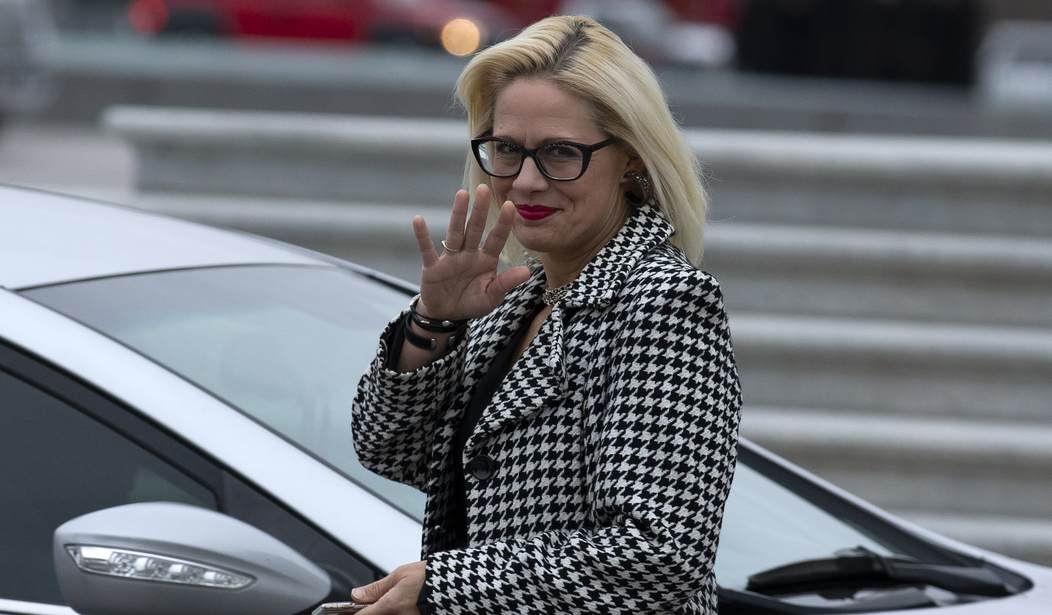When even Joe Manchin can’t get bipartisan talks across the finish line, who you gonna call? The options are limited, but at least one other voice has some potential to move the needle. Kyrsten Sinema will drop in on Joe Biden today to get him to intervene a little more strongly in the process, Politico reports:
President Joe Biden is getting directly involved in the bipartisan infrastructure negotiations, meeting with Sen. Kyrsten Sinema, the lead Democratic negotiator on the discussions, at the White House on Tuesday, according to a source familiar.
The meeting comes as the Arizona Democrat and a group of 10 senators from both parties race to wrap up the $1.2 trillion package amid stubborn disagreements on several policy areas and the bill’s financing. A second source familiar with the meeting said that Biden and Sinema will discuss progress on the bipartisan framework and finishing it up soon.
Late yesterday, Manchin warned that the failure of the bipartisan talks would derail any hope of passing an infrastructure bill of any kind. That appeared to be a none-too-subtle warning to fellow Democrats that Manchin won’t come along on reconciliation for Chuck Schumer’s $3.5 trillion bloated cheeseburger unless they get past the gate on a bipartisan bill first. That raises a couple of questions to which we’ll return in a moment:
Sen. Joe Manchin (D-W.Va.) put his Democratic colleagues on notice Monday night, predicting they would not be able to pass a massive $3.5 trillion spending plan if attempts to piece together a bipartisan $1.2 trillion infrastructure fail.
“I would say that if a bipartisan infrastructure bill falls apart, everything could fall apart,” Manchin told reporters. “… Both of them are extremely important, but [if] one falls apart, how do you do the other one? How’s the other one become more important?”
Sinema apparently has the same reservations about the reconciliation package:
Schumer has vowed that the Senate will pass the bipartisan package and a budget blueprint for a $3.5 trillion social spending package before the August recess. The group of 10 negotiators met Monday evening, but have yet to resolve several outstanding issues, including broadband and transit.
Sinema has yet to sign on to the $3.5 trillion social spending package and her vote, along with Sen. Joe Manchin (D-W.Va.), will be crucial to getting Democrats’ biggest priorities on climate change over the finish line. With an evenly split Senate, Schumer cannot afford to lose a single vote.
Sinema is one of the key negotiators on the Democrats’ side, so this meeting is perhaps not a big signal of a sea change. Still, the signs of collapse seem to be growing, and it’s tough to see this as anything else but a scramble. Republicans and Democrats already began the “blame game” yesterday morning, after a Democratic proposal walked back some of the earlier agreements:
We reported exclusively this morning that a Republican close to the bipartisan infrastructure framework talks warned that the “global offer” Democrats sent to Republicans on Sunday was being met coolly by the GOP.
“Unless Democrats show more flexibility, this deal is unlikely to happen,” the source said.
This morning, a GOP source told our colleagues Marianne LeVine and Burgess Everett something similar, calling the offer “discouraging” and adding that “if this is going to be successful, the White House will need to show more flexibility” and “listen to the members of the group.”
“Blame game beginning,” CNN’s Manu Raju tweeted this morning. “Dem says [Sen. MITT] ROMNEY ‘reneged’ on a deal on water systems and lead pipe contamination. Romney pushes back. Talks more likely to collapse with major sticking points. D leaders will be forced to make decision soon about whether to pull plug.”
Left unexplained is why Republicans are still engaging while Democrats plot a reconciliation package at all. If Democrats want to set an inflation prairie fire, why not let them go it alone? The reconciliation package essentially negates their negotiating position altogether; anything they manage to shear off in the bipartisan bill will simply end up in the reconciliation packages, courtesy of Schumer and his allies.
There are a couple of potential answers for that, however. First, some Republicans truly want to spend money on real infrastructure projects, both for political and structural reasons. Bringing home some bacon before the midterms might be useful, especially for more endangered Senate incumbents. They may also be hoping that agreeing to a bipartisan package managed by Sinema and Manchin will keep those two from supporting the reconciliation measure, which would effectively doom it. Or, to put it another way, Senate Republicans might worry that failing to cooperate on the bipartisan effort will force Manchin and Sinema into supporting the reconciliation package, and might put the filibuster at risk as well.
There are too many incentives for massive spending at this point and too few disincentives to bet against a bipartisan measure of some sort. If and when that passes, Republicans had better hope that Manchin and/or Sinema balk at reconciliation … or they’re going to look like saps.








Join the conversation as a VIP Member